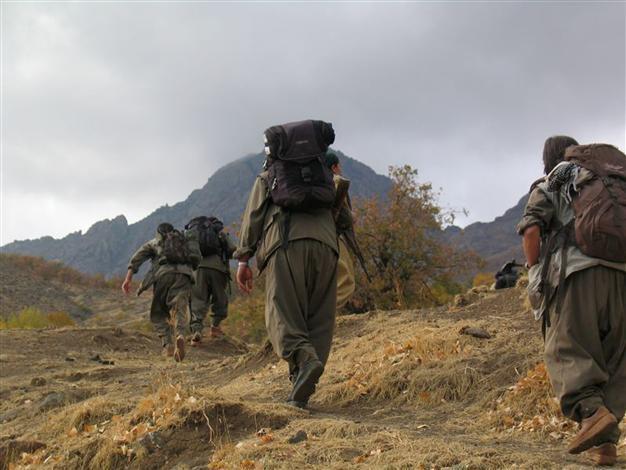PKK militants begin critical pullout from Turkey, BDP co-chair says
ISTANBUL - Agence France-Presse

This handout photo released by the Firat New Agency shows members of the outlawed Kurdistan Workers' Party (PKK) walking in unknown mountains from Turkey through the border with Iraq on May 8, 2013.
Kurdish militants began withdrawing from Turkey into their stronghold in northern Iraq on Wednesday, a major step towards ending a decades-long conflict that has left tens of thousands of people dead.
The pullout is the first visible sign that months of fragile talks between the state and the outlawed Kurdistan Workers' Party (PKK) could succeed in ending 29 years of guerrilla war.
"We know that they have started moving," Selahattin Demirtaş, the Peace and Democracy Party (BDP) co-chair actively involved in the process, told AFP.
About 2,000 militants are expected to begin leaving Turkey on foot, travelling through the mountainous border zone to reach their safe havens in the inhospitable Qandil mountains in northern Iraq.
There they will join another 5,000 fellow militants at the command base which has been used as a springboard for attacks against Turkish security forces.
The withdrawals are expected to take three to four months, with several media outlets reporting that the militants have been on the move for weeks and that May 8 is a "symbolic" date of departure. On Tuesday, the militants said they would not renege on their promise to withdraw following an order from their jailed leader Abdullah Öcalan.
Öcalan called in March for a historic ceasefire from his jail cell after months of clandestine peace talks with Turkish security services.
But if his supporters have agreed to the pullout, they have not yet taken their hands off their guns as the delicate process begins.
The militants on Tuesday complained about Ankara boosting troops and carrying out surveillance flights at the border, saying they were "delaying the peace process" and paving the way for "provocations and clashes." The Turkish army has not confirmed these measures but said their "fight against any terrorism continues", although no fatal clashes have occurred in recent months, the first such lull in years.
Acting PKK leader Murat Karayılan warned late last month that the militants would would strike back and the withdrawal would halt "immediately" if they were attacked.
"We have no doubt about the state but fear provocation from dark forces," Demirtaş said, referring to the possibility of ambushes by splinter paramilitary groups which may not be fond of the process.
Mass withdrawals in 1999 were disrupted when Turkish forces ambushed departing militants, killing around 500 people and wrecking hopes for a permanent peace.
Turkish Prime Minister Recep Tayyip Erdoğan has repeatedly vowed that retreating militants "will not be touched".
He said Tuesday that "laying down weapons" should be the top priority for the PKK, blacklisted as a terrorist group by Ankara and the West, for the process to succeed.
Karayılan said in April that the PKK was expecting Ankara to "do its part" before giving up arms, and called for wider constitutional rights for Turkey's Kurds, who make up around 20 percent of the 75 million population.
A permanent peace could transform Turkey's impoverished Kurdish-majority southeast, where investment has remained scarce and infrastructure insufficient due to the threat of clashes.
It will also impact Erdoğan's political future, after he braved a major nationalist backlash in revealing the negotiations with Öcalan.
Millions of Kurds are expecting Öcalan, who narrowly escaped a death sentence in 2002 after European Union pressure, to be pardoned and join political life.
Öcalan said in his March peace call that a ceasefire would be the beginning of a "new era" for the Kurdish movement.
"It is not the time to give up the struggle, but to start a different one," Öcalan said.
